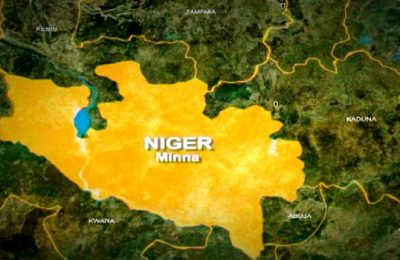
As part of its resolve to ensure food security in the state particularly through dairy production as well reduce the cost of meat which is the major source of protein, the Oyo State government recently held a training on artificial insemination for livestock farmers in the state.
Participants at the training include local farmers, university students, government officials and veterinary technicians.

The training put together by the Oyo state Agribusiness Development Agency (OYSADA), had participants drawn from all the geo-political zones of the state.
The training workshop is part of OYSADA’s broader agribusiness policy, which seeks to address rising beef prices that have impacted consumers and farmers alike.
The programme, it was also gathered, is a national project supported by the World Bank which onboarded Oyo state through the Oyo State Livestock Productivity and Resilience Support Project (L-PRESS) tagged “Training of Livestock Entrepreneurs and State-Level Officers On Artificial Insemination across Focused Livestock Species.
Addressing journalists during the five-day intensive theoretical and practical training which started which held at the International Institute of Tropical Agriculture (IITA), Ibadan, the Executive Adviser to Oyo State Governor on Agribusiness International Corporation and Development, who also doubles as the Director General of Oyo State Agribusiness Development Agency (OYSADA), Dr Debo Akande, noted, that artificial insemination (AI) remains the in-thing across the globe in terms of high yield of livestock production.
He explained that artificial insemination has been done in all the developed countries of the world and that such practice, in line with global best practice, was not peculiar to Nigeria while stressing that such practice has been ongoing for many years with testaments of success.
Dr Akande posited that by adopting advanced reproductive technologies in livestock production such as artificial insemination procedure, Oyo State is on a path to improving the quality and quantity of beef and cow milk production, thereby making it more affordable for residents.
According to the OYSADA DG, the training focuses on the technologies and techniques of artificial insemination, a method that allows for the controlled breeding of livestock with superior genetics, such that accelerates the growth of high-quality cattle herds, increase overall productivity, and ensure a more consistent beef and cow milk supply.
While stressing on the significance of the training, Dr Akande said artificial insemination represents a leap forward in livestock management and that, by equipping farmers with these skills, the governor Makinde led administration is not only boosting production but also supporting the state’s economic stability.
The training programme covered essential topics including reproductive health, semen collection and storage, and insemination techniques. Participants also engaged in hands-on practice to ensure proficiency in the field.
While expressing appreciation to the state governor, Seyi Makinde, for his visionary leadership and approval for the training workshop, Dr Akande noted that the program marks the beginning of a new livestock project in the state that would ensure that residents have access to better quality beef and cow milk in the market at affordable prices.
“We have been rearing goats and cattles for a very long time but we have not been doing it the right way it should be done the modern way. As said earlier, if we want to start getting the best results on our livestock, we need to start adopting modern technologies and techniques. And modern technologies for livestock we’re referring to are many, one of it is what we’re doing training on today which is about Artificial Insemination (AI).
“If we used to get milk of two litters from one animal before, by understanding how to do an artificial insemination of cross breeding, we can start looking at the possibility of getting milk of around nine litters per cow. So, this is about productivity for our livestock where we would be getting more. The meat that we would be getting from these animals will be better meat and then our farmers engaging in livestock will get more money but if we’re talking about Artificial insemination, if we don’t have people that are experts in it, how will they inseminate?
“It is not all insemination of animals that yields success, but by training these people now, we will have a database of people that can train in artificial insemination and the second thing is that we have people that can do artificial insemination better than the way it used to be done.” Dr Akande said.
Speaking on opening up more opportunity for others outside of Ibadan, the state capital to have access to such critical training, Dr Akande said: “We will be training participants that cuts across all the geopolitical zones of Oyo state so, this is not just about Ibadan alone, it’s going to be held at all the other zones so that if anybody wants to do artificial insemination in any of the zones, they would know who to contact and where to go to do that.
“When we are talking about technologies, these are not just what people wake up one day to say let’s use, it’s something that has gone through rigorous scientific testing for diverse reasons; environmental, health, and so on, and concluding results have shown to us that it is environmentally safe, health wise, it is safe for animals and human consumption, so it does not have any negative impact as being speculated by some people.
“This is just a usual situation such as what would have happened in the normal mating of animals that is now happening through artificial procedures. Even we human being do this to have children when we go for IVF medical procedure.
“At one of the state’s Agribusiness hubs such as Fashola farms in Awe, Oyo, investors and private farmers there are already producing more litters of milk than what they used to have, and in that same hub at Fashola, local people are being trained and they’re now applying the knowledge at their different farms. Dr Akande added.
Participants at the training workshop also expressed diverse expectations and optimism about the programme’s potential benefits to them as individuals and the state as a whole.
The State Coordinator Livestock Product Support Project, Mr. Kola Kazeem said, cost of meat in the market would soon reduce because of the ongoing enhanced animal reproduction in the state while noting that the training workshop was the second of its kind since Oyo state was on-boarded at the national level.
The lead resource person at the event, Professor Olofisayo Leigh from the Department of Veterinary, University of Ibadan (UI) lauded the vision by the state government to key into what he also described as the in-thing globally in terms of livestock production for increased meat and cow milk production.
“I’m here for the AI training which is a core area of my professionalism and I’m the lead trainer of this event. I’m here to train them on artificial insemination (AI). AI is a leading technology in animal reproduction. If you want any turn around in animal reproduction, you have to go the way of AI. It’s an assisted reproduction technique and all it does is about cross breeding.
“It’s about improving the breed. The best we can get from our indigenous cattle rear is about 3 to 4 litters of milk in a day whereas in other climes, they get up to 20 to 40 liters of milk in a day. If we have to feed the people in this nation, we have the route of AI.” Professor Leigh said.
Speaking on behalf of members of Oyo Assembly House committee on Agriculture and Rural Development, Honourable Jimoh Lukmon Isola, representing Oorelope state constituency in company of Hon. D Al-Amin, said the committee was present at the training as part of its oversight function, and commended governor Makinde for his pragmatic approach to governance while also commending OYSADA for the programme assuring that the state would immensely benefit from the training in terms of output.
Participants who spoke to newsmen at the training; Abiola John Olusoji, a lecturer from University of Ibadan Teaching and Research Farm, Oluokun Simbiat Fatima, an officer in the Department of Animal Husbandry, Oyo state Ministry of Agriculture and Rural Development, expressed their expectations and desires to acquire deepened practical based knowledge to help them improve on their artificial insemination skills in their careers.
READ ALSO: Food insecurity: Army deploys officers to protect farmers in the north







